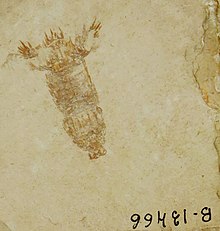| Sculda Temporal range:
| |
|---|---|

| |
| Fossil of S. pennata | |
| Scientific classification | |
| Domain: | Eukaryota |
| Kingdom: | Animalia |
| Phylum: | Arthropoda |
| Class: | Malacostraca |
| Order: | Stomatopoda |
| Family: | †Sculdidae |
| Genus: | †Sculda Münster, 1840 |
| Type species | |
| †Sculda pennata Münster, 1840
| |
| Other species | |
| |
| Synonyms | |
| |
Sculda (after Skuld from Norse mythology) is an extinct genus of mantis shrimp known from the late Jurassic to late Cretaceous of Germany and Lebanon. Although several species have been assigned to it, some are now deemed dubious or moved to different genera. It was a moderate-sized crustacean, measuring no more than 50 mm (2.0 in) long. Sculda would have lived in a marine environment and been a predatory animal, likely smashing its prey with the widened segment of its raptorial appendages before cutting it with the sharp appendage tips.
The genus was first named in 1840 by Georg zu Münster, based on fossils collected from the Solnhofen Limestone of Bavaria, Germany. It was the first Mesozoic mantis shrimp to be discovered and named, though it was initially misidentified as an isopod. Sculda is generally placed in the family Sculdidae, though this family has been proposed to be polyphyletic.